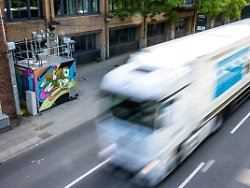Tuesday, November 30th, 2021
Settled legal dispute with DUH
Stuttgart reports: The air is clean
Environmental aid complaints about dirty air are pending against 40 German cities. In Stuttgart, the legal dispute has now been settled because the nitrogen oxide limit values are being complied with. But the DUH boss warns: You will measure if the traffic increases again after the end of the pandemic.
The longstanding legal dispute over air pollution control in the Baden-Württemberg state capital Stuttgart has been settled. “After many years and a variety of efforts, we have succeeded in making the air in Stuttgart cleaner,” said the Green State Transport Minister Winfried Hermann. In 2021, the limit values for nitrogen dioxide would be complied with at all measuring stations for the first time. The German Environmental Aid (DUH) had enforced driving bans for diesel cars in Stuttgart, among other places.
In Stuttgart, the pollution in the air was for many years well above the limit values set by the EU. The limit values for nitrogen oxides were decided in 2008 and have been binding since 2010. According to this, the annual mean for nitrogen dioxide (NO2) must not exceed 40 micrograms at any measuring point, and the hourly mean may not exceed the threshold of 200 micrograms a maximum of 18 times a year.
In Stuttgart, the centrally located Neckartor was for years the front runner in terms of air pollution – in 2018 the maximum value was 71 micrograms per cubic meter in the annual average and in 2019 it was 53 micrograms. In 2020, the limit values were met for the first time at the junction with 38 micrograms. For the months from January to October 2021, the mean value is currently 35 micrograms, so the limit value can also be complied with this year, the state government said.
Main cause of diesel vehicles
The main cause of air pollution in Stuttgart is therefore car traffic, especially diesel vehicles. At the beginning of 2019, driving bans for certain diesel vehicles were therefore imposed after a series of court proceedings in Stuttgart. In February, the DUH, with reference to the persistently poor air quality, requested the extension of the measures in a foreclosure application. The state government had responded with a defensive suit. Both sides have now withdrawn their complaints, as the state government in Stuttgart said.
“We hope that the state government and the city will stay on course,” said DUH Federal Managing Director Jürgen Resch. The measures taken have led to an improvement in air quality, but the reduced volume of traffic in the corona pandemic also made a contribution.
The DUH will therefore “specifically measure how the air quality is developing at critical points”, announced Resch. Should the pollution increase again, the DUH will “report immediately with a new application”. In total, Deutsche Umwelthilfe had sued nine federal states for better air in a total of 40 cities and, where necessary, also called for driving bans for diesel cars. The federal states had mostly dismissed this as excessive.
